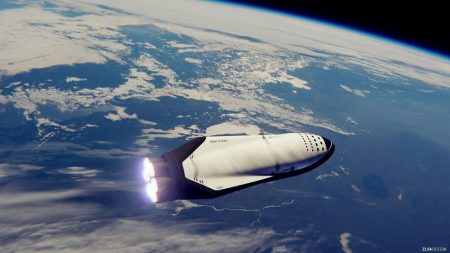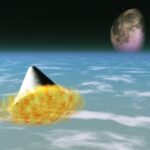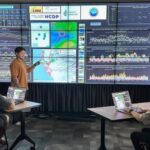November 8, 2018 – Replacing the second stage of a Falcon 9 with a miniature version of the BFR is the latest plan by SpaceX to test key design components of its next-generation rocket system. The real thing, a giant reusable spaceship, is being built in Los Angeles, California. Designed to fly to the Moon and Mars, the BFR’s command module (now called the BFS) will have the capacity to carry 100 aboard. Testing something that will be designed for multiple reuse, and that is that large will be far more difficult at full size.
SpaceX wants to ensure that its design is airworthy on flight re-entry and landing. That means composite materials used to build the BFS have to undergo stress testing. The heat shield materials and structure also need to be thoroughly tested. The upper stage of SpaceX existing Falcon 9, therefore, will be redesigned for these tests. The test miniature versions of the BFS will be non-propulsive on re-entry with plans for supersonic de-orbit maneuvers and test landings at a site in South Texas.
Just when will these test flights start? Speculation says sometime before 2020. That will allow SpaceX to work out any design flaws for a planned mid-2020s human-crewed flight to Mars.
One should read this announcement in the context that so many of SpaceX’s milestone deadlines have moved back from the beginning of its first efforts to build a reusable rocket system. And many announced initiatives have fallen by the wayside over the years as SpaceX has come up against engineering and financial realities.
The news of this interim plan comes from Elon Musk in a series of November 7 Twitter feeds. Musk optimistically predicts that a first orbital test will happen by next June. In a further Tweet, Musk explains in an answer to one of his followers why the test landings over South Texas will be non-propulsive. The obvious reason is differences in density, composition, and angle of entry to the Earth’s atmosphere as compared to what will be needed for Mars. He further comments that SpaceX already has a good handle on propulsive landings.
SpaceX is putting all of its resources and rocket wizardry behind the development of the BFR and BFS. Musk wants to establish a large human presence on Mars before the end of this century because he is convinced humanity on this planet needs an option should an extinction event happen here. The BFR and BFS is his vision of how to make this happen by ferrying as many as 100 or more passengers at a time to the Red Planet.
There is no discussion about what happens should we discover native life on Mars and the implications that would have on any human colonization of the planet including some of Musk’s ideas for terraforming it to make it more suitable for habitation.
The BFR and BFS, however, have a number of Earth-bound uses as Musk has explained. The system would replace Falcon 9 as the company’s primary space launch system for orbital missions, and would also serve as a sub-orbital commuter spaceliner capable of sending people around the world faster than any existing form of travel today. For example, a BFS could offer a passenger service for commuters between New York City and Tokyo taking less than 45 minutes on one-way flight. Musk has imagined an entire spaceport infrastructure for his Earth-based commuter service with multiple launches per day because of the reusability and quick turnaround capability of the systems his company is designing.
Of course, currently, we know that the current Falcon 9, Block 5 configuration has successfully flown two missions back to back without extensive refitting. A third mission will represent the next leap in reusability getting us one step closer to Musk’s goal.








